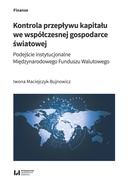Explore

Kontrola przepływu kapitału we współczesnej gospodarce światowej
0 Ungluers have
Faved this Work
Login to Fave
The management of international capital flows is a new phenomenon in international financial relations. The IMF's institutional approach to capital controls is a new concept in international relations. For the first time in Polish literature, they were collected in a uniform study. The aim of the monograph is to review selected approaches and research on the determinants of the application of capital controls in the global economy from the perspective of the International Monetary Fund. The financial revolution, the beginning of which dates back to the 20th century, globalization and the development of technology create, on the one hand, opportunities for the development of individual countries, and on the other hand, they carry threats unprecedented in the economic history of the world. Sudden stops, financial crises in the 1990s and in the two decades of the 21st century caused by capital flows gave rise to their institutional location. For the first time in 2012, the International Monetary Fund, following the outbreak of the global financial crisis, adopted the Institutional View, which states that it is possible for the authorities of given countries to apply measures to control the international movement of capital. The COVID-19 pandemic and the war in Ukraine led to a renewed revision of the views of the International Monetary Fund on the management of international capital flows. The revision of the Institutional View made in 2022 at the IMF states that the problem of capital control is current, important and urgent to be solved in the context of maintaining the financial stability of the global economy.
This book is included in DOAB.
Why read this book? Have your say.
You must be logged in to comment.
